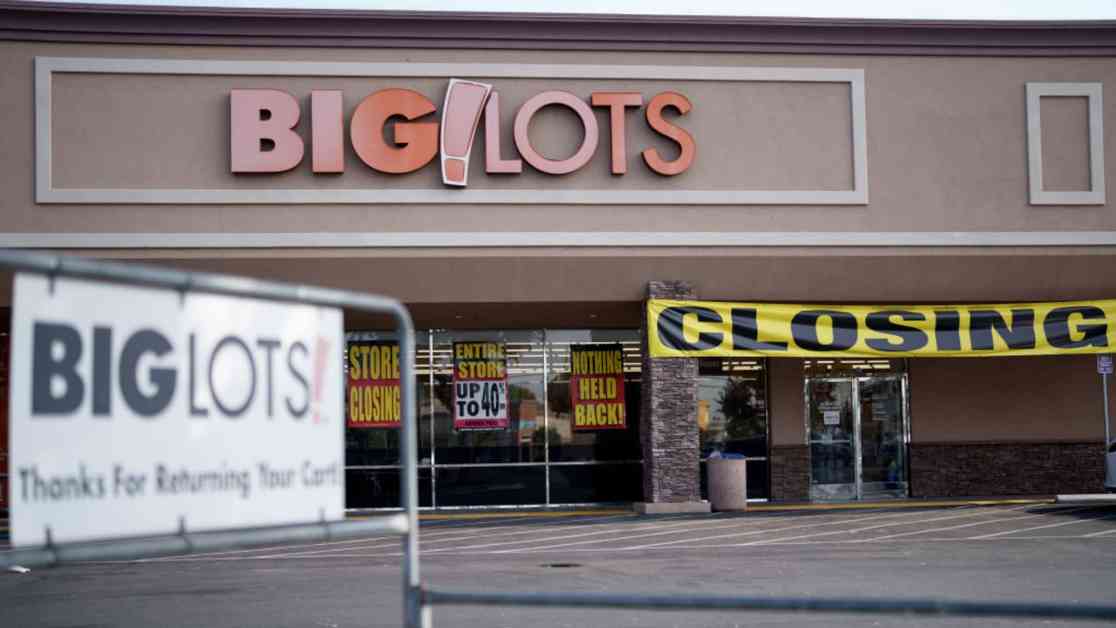Big Lots, a discount home goods retailer with a significant presence across the United States, has recently filed for Chapter 11 bankruptcy protection. This move comes as a result of various challenges the company has faced, including high interest rates and a sluggish housing market that have impacted consumer demand for its low-priced furniture and decor. Despite these setbacks, Big Lots remains committed to offering extreme bargains to its loyal customers.
## Plans for Restructuring and Moving Forward
In response to its financial difficulties, Big Lots has agreed to sell its business to private equity firm Nexus Capital Management for approximately $760 million. This acquisition includes a cash payment of $2.5 million, in addition to taking over the company’s remaining debt and liabilities. As part of the bankruptcy filing, Big Lots plans to close nearly 300 stores in order to streamline its operations, improve its financial standing, and reduce costs.
CEO Bruce Thorn expressed optimism about the company’s future prospects under new ownership, stating, “The actions we are taking today will enable us to move forward with new owners who believe in our business and provide financial stability. We remain committed to offering extreme bargains, enabling easy shopping in our stores and online, and providing an outstanding customer experience.”
Nexus Capital Management’s Managing Director, Evan Glucoft, also expressed confidence in Big Lots’ potential for growth, saying, “We are excited to have the opportunity to partner with Big Lots and help return this iconic brand to its status as America’s leading extreme value retailer.” The firm believes that Big Lots’ best days are still ahead, despite the current challenges facing the company.
## Economic Challenges and Competitive Landscape
Big Lots’ struggles are not unique in the retail industry, as many companies have been impacted by macroeconomic factors such as high inflation and interest rates. The company’s core customer base, which consists primarily of lower- and middle-income consumers, has been particularly affected by these economic trends, leading to a reduction in discretionary spending on home and seasonal products.
Moreover, Big Lots operates in a highly competitive market, where it faces stiff competition from other discount retailers that offer similar home goods at competitive prices. Retail giants like Walmart, online retailers like Wayfair, and discount chain stores like TJX Cos.’ Home Goods all pose significant challenges to Big Lots’ market share and profitability.
Neil Saunders, managing director of GlobalData, highlighted some of the issues that Big Lots faces in terms of its value proposition and product assortment. He noted that while the company offers affordable prices, many items can be found cheaper at other stores, leading to questions about the true value of shopping at Big Lots. Additionally, the company’s product assortment has been criticized for being jumbled and muddled, which detracts from the overall shopping experience.
## Path to Recovery and Future Growth
Despite these challenges, Big Lots remains optimistic about its ability to recover and thrive in the future. The company’s decision to file for Chapter 11 bankruptcy protection and sell to a private equity firm is a strategic move aimed at restructuring its operations, reducing costs, and improving its financial stability. By closing underperforming stores and focusing on its core business strengths, Big Lots hopes to emerge from this process stronger and more competitive in the retail market.
As part of the bankruptcy process, Big Lots will hold a court-supervised auction for its business, giving other potential buyers the opportunity to make a bid higher than Nexus’ offer. This auction could potentially result in a different buyer acquiring the company, depending on the bids received. Big Lots is working with legal and financial advisors to navigate this complex process and ensure the best outcome for its stakeholders.
In conclusion, Big Lots’ decision to file for bankruptcy protection and sell to a private equity firm signals a new chapter in the company’s history. Despite the challenges it faces in the retail industry, Big Lots remains committed to offering extreme bargains and providing a unique shopping experience for its customers. With the support of its new owners and a strategic focus on operational improvements, Big Lots is poised to overcome its current obstacles and emerge as a stronger and more resilient retailer in the future.






















